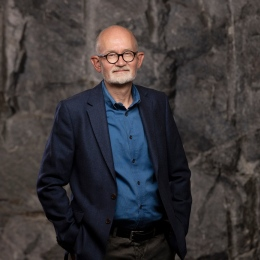Keynote speakers and talks

Fiona Farr
(University of Limerick)
Reflection, Retroflection and Introspection: Researching Professional Practices in English Language Teacher Education through Corpus-Based Discourse Analyses
Bio:
Fiona Farr External link, opens in new window. is Associate Professor of Applied Linguistics and TESOL in the School of Modern Languages and Applied Linguistics at the University of Limerick, Ireland. She is also Director of the Centre for Applied Language Studies (CALS). Her key areas of expertise are teacher education, reflective practice, continuous professional development, applied corpus linguistics, and technology-enhanced language learning.
External link, opens in new window. is Associate Professor of Applied Linguistics and TESOL in the School of Modern Languages and Applied Linguistics at the University of Limerick, Ireland. She is also Director of the Centre for Applied Language Studies (CALS). Her key areas of expertise are teacher education, reflective practice, continuous professional development, applied corpus linguistics, and technology-enhanced language learning.
She has published widely in high-impact journals in her field and is author of Teaching Practice Feedback: An Investigation of Spoken and Written Modes (2011, Routledge) and Practice in TESOL (2015, Edinburgh University Press). Her recent book Social Interaction in Language Teacher Education (with Angela Farrell and Elaine Riordan) was published in 2019, and in 2023 her new co-authored book (with Angela Farrell) The Reflective Cycle of the Teaching Practicum will be published. She is co-editor (with Bróna Murphy) of the EUP Textbooks in TESOL Series, and is Associate Editor of the journal Second Language Teacher Education. She is also co-editor (with Liam Murray) of the Routledge Handbook of Language Learning and Technology (2016), for which a second edition is currently being compiled.
She has been Visiting Research Scholar at Lancaster University where she was part of a large ESRC-funded research project, ‘Corpus Approaches to Social Science'. She has also led and taken part in a number of national in international projects including 'Digilanguages' (2016-2017) and 'Shout4HE' (2018-2021). She is currently a partner on the Digital Humanities project 'Interactional Variation Online' External link..
External link..
Abstract:
In this talk, I will explore the diverse and fascinating world of (English) language teacher education (ELTE), a field in which I have been immersed for the past twenty-five years, both as a practitioner and a researcher. I will do this through the lens of reflective practice, what it is and how it gets done in teacher education contexts. Having explored some of the relevant theoretical discussions and previous research in the field, I will outline a number or research studies in which I have engaged over the past two and a half decades. Although my primary research methodology centres around corpus-based discourse analysis of the Teacher Education Corpus (TEC) I have built and worked on collaboratively over this period, I also explore the importance of mixed methodologies for better insights and interpretations. Several relevant themes and linguistic exponents will be investigated, with real data from the corpus and some of my research projects. The talk will finish with a discussion of the future of research in this area and its implications for practice in ELTE professional contexts.
%20Tom%20Morton.jpg)
Tom Morton
(Universidad Autónoma de Madrid)
Rethinking the Roles of English as a Medium for Teaching and Learning at University: Putting Knowledge Practices at the Centre of the Picture
Bio:
Tom Morton External link, opens in new window. is Beatriz Galindo Distinguished Research Fellow at the Universidad Autónoma de Madrid, Spain. His research focuses on language development and knowledge construction in secondary school bilingual education and university English Medium Instruction. He is particularly interested in the professional development and identities of teachers in both contexts. He co-authored (with Ana Llinares and Rachel Whittaker) The Roles of Language in CLIL (2012, Cambridge University Press), and (with John Gray) Social Interaction and English Language Teacher Identity(2018, Edinburgh University Press). He co-edited (with Ana Llinares) Applied Linguistics Perspectives on CLIL (2017, Benjamins), which won the senior research prize of the Spanish Association for Applied Linguistics. He is co-founder of the journal Classroom Discourse.
External link, opens in new window. is Beatriz Galindo Distinguished Research Fellow at the Universidad Autónoma de Madrid, Spain. His research focuses on language development and knowledge construction in secondary school bilingual education and university English Medium Instruction. He is particularly interested in the professional development and identities of teachers in both contexts. He co-authored (with Ana Llinares and Rachel Whittaker) The Roles of Language in CLIL (2012, Cambridge University Press), and (with John Gray) Social Interaction and English Language Teacher Identity(2018, Edinburgh University Press). He co-edited (with Ana Llinares) Applied Linguistics Perspectives on CLIL (2017, Benjamins), which won the senior research prize of the Spanish Association for Applied Linguistics. He is co-founder of the journal Classroom Discourse.
Abstract:
In this talk I will argue that university English Medium Instruction (EMI), which is the teaching of academic disciplines through English in non-Anglophone countries, is somewhat fragmented at the levels of conceptualization and practice.
I will propose that putting knowledge and knowledge practices at the centre of EMI can help to overcome fragmentation, address issues such as content and language integration and teacher professional development, and provide a basis for cumulative knowledge building in the field. I introduce Legitimation Code Theory (LCT), which is a realist sociological framework for investigating and improving knowledge practices. It offers a conceptual toolkit to be used in empirical studies which reveal the underlying organizing principles of knowledge practices in different fields. LCT can be used in interdisciplinary studies in combination with other frameworks (such as Systemic Functional Linguistics) and is adaptable to a wide range of qualitative and quantitative methodological approaches.
I present an overview of LCT (particularly its three dimensions of Specialization, Semantics and Autonomy). Using data from an ongoing research project, I then show how each of these dimensions can address specific issues in EMI research and practice, using a range of methodological approaches, such as Multimodal Conversation Analysis, and quantitative, corpus-based techniques using text-annotation software. I suggest how the results achieved so far can be further developed into video-enhanced training and professional development activities for lecturers in EMI programmes.

Bo G Ekelund
(Stockholm University)
Knowable and Unknowable: Communities and the Novel
Bio:
Bo G. Ekelund External link, opens in new window. is a Professor of English Literature at the Department of English, Stockholm University. His articles within the field of the sociology of literature have been published in Poetics, Novel and Ariel, among other journals. He is currently working on a geometric study of the construction of fictional space in thirty-two Caribbean novels. This project involves the larger issue of how territories are claimed by literary texts, the topic of the 2022 book Claiming Space: Locations and Orientations in World Literatures, co-edited by Ekelund.
External link, opens in new window. is a Professor of English Literature at the Department of English, Stockholm University. His articles within the field of the sociology of literature have been published in Poetics, Novel and Ariel, among other journals. He is currently working on a geometric study of the construction of fictional space in thirty-two Caribbean novels. This project involves the larger issue of how territories are claimed by literary texts, the topic of the 2022 book Claiming Space: Locations and Orientations in World Literatures, co-edited by Ekelund.
Abstract:
In my keynote talk I will pick up a thread that runs from Raymond Williams’s discussion of “knowable communities” (1973) to Fredric Jameson’s reflections on the difficulty of representing any collective in narrative (2013). I will add to that thread the perspective of fictional-worlds theory and move from observations on the current vogue for “world-building” in verbal and visual narratives to a closer consideration of knowable and unknowable communities in recent speculative fiction, including Hanya Yanagihari’s To Paradise, N. K. Jemisin’s Broken Earth trilogy, and Robin MacLean’s Pity the Beast. I hope to end up in some as yet unpredictable position, but my investigation is motivated by a fundamental scepticism regarding the representational and political status of “communities.”
